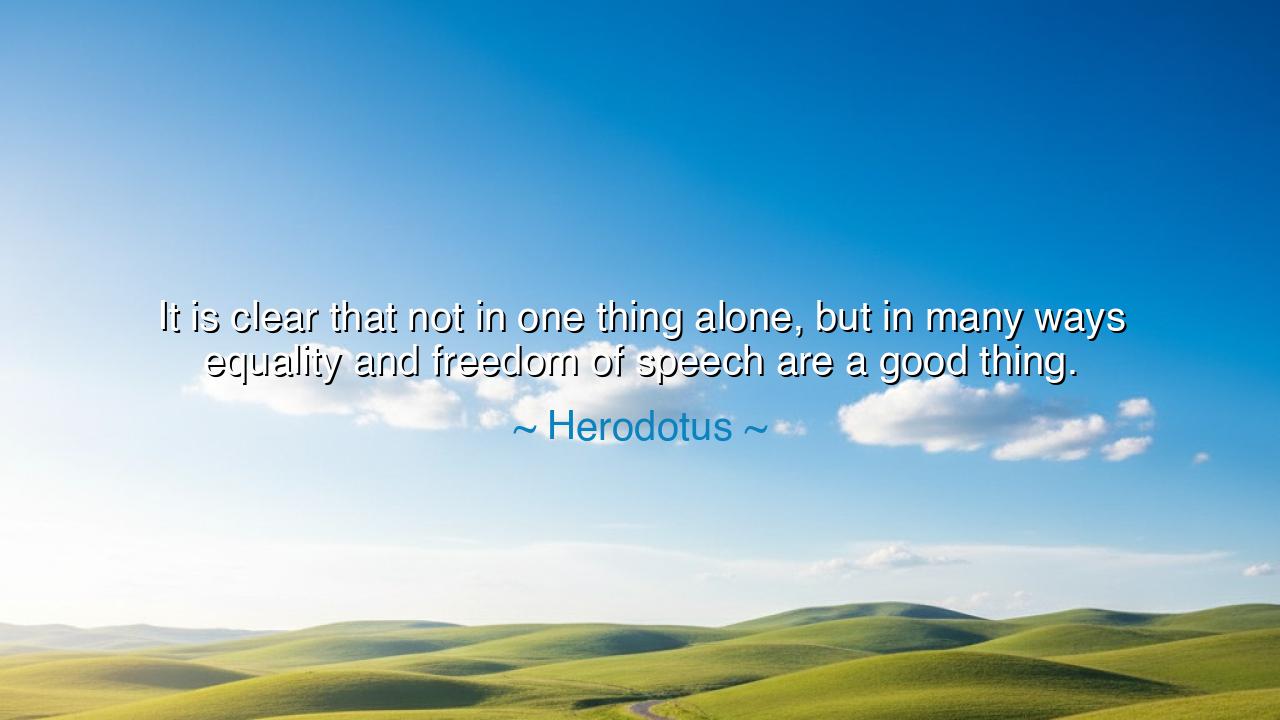
It is clear that not in one thing alone, but in many ways
It is clear that not in one thing alone, but in many ways equality and freedom of speech are a good thing.






"It is clear that not in one thing alone, but in many ways equality and freedom of speech are a good thing." These words by Herodotus, the ancient historian, encapsulate a timeless truth about the value of freedom and equality in the growth of societies. Herodotus, who chronicled the rise and fall of civilizations, understood that a prosperous society cannot be built solely on one principle or virtue. The interplay of equality and freedom of speech creates a foundation for justice, progress, and individual flourishing. It is through these principles, applied in many facets of life, that a society truly becomes just and free.
In the ancient world, the idea of freedom and equality was most prominently embodied in the concept of the Greek polis, or city-state. The Athenians, particularly, prided themselves on their ability to engage in public discourse and debate, which they believed were essential for the health of their society. Pericles, the great Athenian leader, understood that freedom of speech was not just an individual right, but the lifeblood of a functioning democracy. Citizens were encouraged to speak their minds, participate in the assembly, and contribute to the decision-making processes that shaped the city. This was a society that recognized that for freedom to be meaningful, it must extend to all corners of life—not just in politics, but in culture, art, and personal relationships.
Yet, even in ancient times, there were challenges to the balance of freedom and equality. Socrates, for example, was famously tried and executed for his beliefs and his habit of questioning authority in Athens, where free speech was valued. His trial, and the subsequent death sentence, demonstrated the fragile nature of freedom of speech. The truth is that freedom does not always guarantee protection from those who feel threatened by it, and equality is often difficult to maintain when power dynamics shift. Herodotus’s words highlight that equality and freedom must be guarded not just in one area of life, but across all spheres of society, so that they remain firmly established and difficult to undermine.
Consider the history of Rome—once a republic grounded in the principles of equal participation and free speech. However, as the Republic gave way to the Empire, the Roman people lost their voice in political matters, and freedom of speech became restricted. Augustus, while a brilliant ruler, recognized that true power lay in the ability to control the flow of information and speech. As the Roman Empire expanded, the idea of equality became skewed, with a growing divide between the elites and the common people. The fall of Rome was, in part, the result of this erosion of freedom and equality, a stark reminder that the integrity of these values is crucial for a society’s lasting success.
Herodotus’s statement also speaks to the importance of balance—that freedom of speech and equality are not static or singular principles but must be applied in a variety of ways to ensure they are effective. Equality, for instance, is not merely about ensuring that individuals have equal opportunities but also about guaranteeing that the voices of the marginalized and oppressed are heard. Freedom of speech is not just about the ability to speak without fear of repercussion, but about ensuring that all voices—no matter their status—are allowed to contribute to the collective wisdom of society. This balance requires vigilance and care, for it is all too easy to allow these principles to slip away, often under the guise of “order” or “security.”
The lesson from Herodotus is one of vigilance, participation, and responsibility. As individuals and as members of a community, we must recognize that equality and freedom of speech are not privileges to be taken for granted but rights that must be protected, nurtured, and expanded. These rights are not just to be cherished for their own sake, but because they form the foundation for innovation, progress, and justice. In societies where these values are strong, people can debate, question, and grow together, making decisions that reflect the collective good. The true strength of any society lies in its ability to embrace the diversity of thought and the equality of all voices.
In our own lives, we must embrace these principles in both our words and actions. Speak out when you see injustice, engage with others who may hold different views, and ensure that your society remains a place where all voices can be heard. Equality should not just be a law or a principle but a living practice—a way of interacting with one another, a way of ensuring that the marginalized and silenced are not overlooked. Let us remember that freedom of speech is not just a right but a responsibility, one that we must exercise daily in order to preserve the strength and vitality of our communities. In doing so, we can build a society where justice and growth are possible, and where all people, regardless of their position, have the opportunity to contribute to the greater good.






AAdministratorAdministrator
Welcome, honored guests. Please leave a comment, we will respond soon